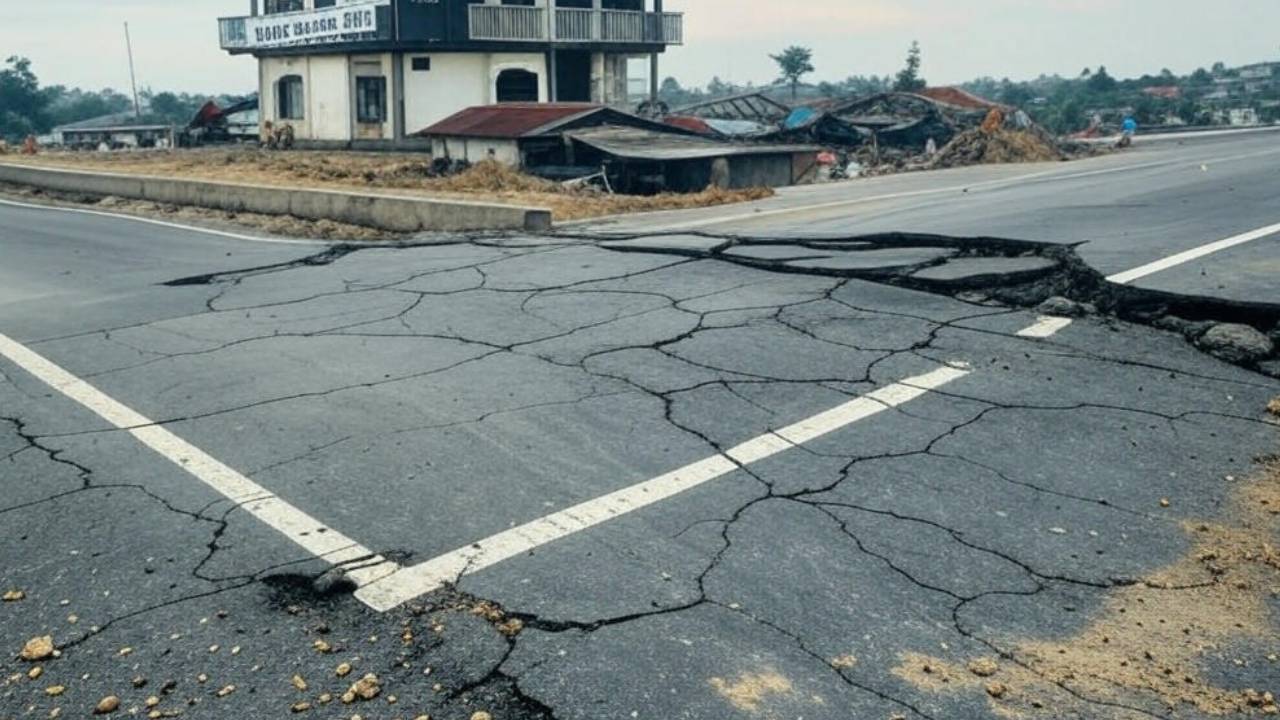india
“Major Crash of Sukhoi Su-30 and Mirage 2000 Fighter Jets in Madhya Pradesh”
Thankfully, the two pilots from the Su-30 were able to eject and are currently safe. However, search and rescue operations are currently underway for the third pilot.

Bhopal: Two Indian Air Force fighter jets, a Sukhoi Su-30 and a Mirage 2000, have crashed in Madhya Pradesh during a training exercise. Defence sources have confirmed that the Su-30 had two pilots and the Mirage 2000 had one pilot.
Thankfully, the two pilots from the Su-30 were able to eject and are currently safe. However, search and rescue operations are currently underway for the third pilot.
Both fighter jets had taken off from the Gwalior Air Force base prior to the crash. Videos of the scene, taken by locals in Morena, show debris of the aircraft scattered on the ground.
The Indian Air Force has launched an investigation to determine if a mid-air collision led to the crash. Defence sources have stated that an IAF court of inquiry has been established to establish the cause of the crash.
Initial reports suggest that the two pilots of the Su-30 are safe and an IAF chopper is on its way to reach the location of the third pilot.
Defence Minister Rajnath Singh has been briefed by the Indian Air Force chief on the crash of the two aircraft, according to news agency PTI.
Madhya Pradesh Chief Minister Shivraj Singh Chouhan has expressed his sadness over the news of the crash. He has instructed local authorities to cooperate with the Air Force in quick rescue and relief work and has prayed for the safety of the pilots.
The Sukhoi Su-30 is a twin-engine, two-seat fighter jet that is known for its advanced avionics, long range and heavy payload capabilities. The Mirage 2000 is a single-engine, fourth-generation jet fighter that is known for its high maneuverability and multirole capabilities.
Training exercises are a crucial aspect of the Indian Air Force’s operations, as it helps pilots to maintain their proficiency and readiness for any potential conflict. However, such incidents highlight the inherent risks that come with military aviation.
The Indian Air Force will continue to investigate the cause of the crash and take necessary measures to prevent similar incidents in the future. The thoughts and prayers of the nation are with the families of the pilots and the ongoing search and rescue operations.
Karnataka
Hubli Tragic Incident : Migrant Worker Suspected in Child’s Murder Dies in Police Encounter
In a heartbreaking event that has shaken Hubballi, Karnataka, a five-year-old girl was allegedly kidnapped and killed, sparking outrage in the community. The suspect, a 35-year-old migrant worker from Patna, Bihar, was later killed in a police encounter on Sunday, April 13, 2025, according to authorities. The incident began when the young girl’s body was […]

The shocking incident in Hubli has intensified concerns over child safety and sparked widespread public outrage.
In a heartbreaking event that has shaken Hubli, Karnataka, a five-year-old girl was allegedly kidnapped and killed, sparking outrage in the community. The suspect, a 35-year-old migrant worker from Patna, Bihar, was later killed in a police encounter on Sunday, April 13, 2025, according to authorities.
The incident began when the young girl’s body was discovered in an abandoned shed, prompting a swift response from the Karnataka Police. Using CCTV footage, officers identified the suspect, Ritesh Kumar, who was accused of abducting and murdering the child. Authorities suspect the girl may have been sexually assaulted before her death, though they are awaiting postmortem results to confirm.
As the investigation unfolded, police tracked Kumar to an abandoned house near the Tarihal underpass. According to Hubli-Dharwad Police Commissioner N. Shashi Kumar, the suspect attempted to escape custody, attacking officers by throwing stones and damaging vehicles. In response, Sub-Inspector Annapurna fired warning shots before shooting Kumar in the leg and chest. He was rushed to Karnataka Medical College and Research Institute – Hubli but was declared dead on arrival.
The tragedy has left the victim’s family, originally from Koppal district, in deep grief. The girl’s mother works as a domestic helper and beauty parlor assistant, while her father is a painter. The community rallied outside Ashok Nagar police station, demanding justice and expressing frustration. Some locals called for harsh punishment, while others raised concerns about migrant workers, though the Police Commissioner urged against generalizations.
This devastating case has highlighted issues of child safety and crime in Karnataka, with authorities emphasizing their commitment to justice. The investigation continues as police await further reports to provide clarity on the circumstances of the girl’s death.
india
Lakhs Unite at Deekshabhoomi and Chaityabhoomi to Celebrate Dr. B.R. Ambedkar’s Birth Anniversary
On April 14, 2025, a sea of people flooded Deekshabhoomi in Nagpur and Chaityabhoomi in Mumbai to pay heartfelt tributes to Dr. Bhimrao Ramji Ambedkar, fondly known as Babasaheb, on his birth anniversary. The atmosphere buzzed with reverence and unity as lakhs of followers came together to celebrate the life and legacy of the man […]

On April 14, 2025, a sea of people flooded Deekshabhoomi in Nagpur and Chaityabhoomi in Mumbai to pay heartfelt tributes to Dr. Bhimrao Ramji Ambedkar, fondly known as Babasaheb, on his birth anniversary. The atmosphere buzzed with reverence and unity as lakhs of followers came together to celebrate the life and legacy of the man who drafted India’s Constitution and championed social justice.
A Day of Remembrance and Inspiration
From early morning, devotees, activists, and admirers thronged these iconic sites, carrying flowers, candles, and banners adorned with Ambedkar’s quotes. Deekshabhoomi, where Dr. Ambedkar embraced Buddhism in 1956, and Chaityabhoomi, his cremation site, transformed into vibrant hubs of reflection. People of all ages—students, families, and community leaders—joined hands to honor his contributions to equality, education, and human rights.
Cultural programs, speeches, and prayer ceremonies filled the day. Local organizations hosted events highlighting Ambedkar’s role as a global icon of social reform. “His vision continues to guide us toward a just society,” said one attendee, echoing the sentiments of many.
Enhanced Security and Smooth Arrangements
With massive crowds expected, authorities ensured tight security and seamless arrangements. Mumbai’s Chaityabhoomi saw barricades and police presence to manage the flow of visitors, while Nagpur’s Deekshabhoomi welcomed devotees with well-organized facilities. Volunteers distributed water and food, ensuring everyone could focus on the occasion’s significance.
Leaders Pay Tribute
Prominent figures joined the commemorations, with Maharashtra Chief Minister Devendra Fadnavis sharing a heartfelt message: “Saluting Dr. Babasaheb Ambedkar, the Father of our Constitution and a beacon of social justice, on his birth anniversary.” His words resonated across social media, amplifying the day’s importance.
Why This Day Matters
Dr. Ambedkar’s birth anniversary, celebrated as Ambedkar Jayanti, is more than a historical event—it’s a reminder of his relentless fight against caste discrimination and inequality. His teachings inspire millions to strive for a fairer world. Deekshabhoomi and Chaityabhoomi remain sacred spaces, symbolizing hope and resilience for marginalized communities.
A Legacy That Lives On
As the sun set, the crowds lingered, unwilling to leave the places that hold such deep meaning. For many, visiting these sites was a personal pilgrimage, a chance to connect with Ambedkar’s ideals. “He showed us the path to dignity,” said a young student, clutching a copy of the Constitution.
Ambedkar Jayanti 2025 wasn’t just a celebration—it was a powerful call to uphold justice, equality, and unity. As lakhs returned home, they carried with them the spirit of Babasaheb, ready to keep his legacy alive.
india
Earthquakes Shake India and Neighboring Asian Nations: What’s Happening?
On April 12, 2025, a series of earthquakes rattled parts of India and several neighboring Asian countries, leaving communities on edge. From the Himalayan foothills to coastal regions, the tremors have sparked concern, with residents sharing their experiences and authorities rushing to assess the damage. Here’s a closer look at the unfolding situation.

On April 12, 2025, a series of earthquakes rattled parts of India and several neighboring Asian countries, leaving communities on edge. From the Himalayan foothills to coastal regions, the tremors have sparked concern, with residents sharing their experiences and authorities rushing to assess the damage. Here’s a closer look at the unfolding situation.
Where Earthquakes Hit India
The quakes, ranging in intensity, were felt across northern India, including states like Uttar Pradesh and Bihar, as well as in neighboring nations such as Nepal, Bhutan, and Bangladesh. Early reports suggest the epicenter may have been near the India-Nepal border, a region known for its tectonic activity due to the collision of the Indian and Eurasian plates. While exact magnitudes are still being confirmed, the shaking was strong enough to jolt people from their homes and offices.
In India, cities like Lucknow and Patna reported mild tremors, with some residents feeling the ground sway for a few seconds. Across the border, Kathmandu and Dhaka experienced similar disturbances, raising fears of aftershocks. “It felt like the floor was moving under my feet,” said a local from Bihar, capturing the sudden panic that gripped the region.
Impact on Communities
So far, no major casualties or widespread destruction have been reported, but the situation remains fluid. In rural areas, where infrastructure is often less resilient, cracks have appeared in some homes, and power outages were noted in isolated spots. Authorities are urging people to stay cautious, especially in earthquake-prone zones like the Himalayas.
Social media is buzzing with videos of swaying buildings and panicked evacuations, while local officials are conducting safety checks. Schools and offices in affected areas have been closed as a precaution, and emergency response teams are on standby. “We’re prepared to act if things worsen,” a disaster management official stated, emphasizing the need for vigilance.
The Indian subcontinent sits on a seismic hotspot, making earthquakes a recurring concern. Experts link this recent activity to the ongoing tectonic shifts along the Himalayan fault line, which has triggered significant quakes in the past, like the 2015 Nepal earthquake. While the current tremors appear less severe, they serve as a reminder of nature’s unpredictability.
Trending discussions online highlight how climate change and geological stress might be amplifying such events, though this remains inconclusive. Residents are being advised to follow safety drills—drop, cover, and hold on—and avoid old or weak structures until cleared by experts.
As seismologists analyze data, the focus is on predicting aftershocks and ensuring public safety. The Indian Meteorological Department and regional agencies are working together to issue updates. For now, communities are holding their breath, hoping the worst is over.
Stay informed as the story develops. Have you felt the tremors? Share your experience in the comments below!
-

 Sports2 years ago
Sports2 years agoWFI meetings on April 16, elections likely to be discussed
-

 india1 year ago
india1 year agoPM Modi Meets Deve Gowda for Seat Sharing Talks
-

 india1 year ago
india1 year agoBengaluru: False threat to bomb Raj Bhavan
-

 india2 years ago
india2 years ago“AIMIM to Contest 50 Seats in Upcoming Telangana Assembly Elections”
-

 Entertainment1 year ago
Entertainment1 year agoAnant Ambani: Controversy at the Ambani Pre-Wedding Bash
-

 Karnataka2 years ago
Karnataka2 years agoWomen have to show their Aadhaar to travel free on KSRTC bus
-

 Entertainment2 years ago
Entertainment2 years agoRajinikanth is Moideen Bhai in ‘Lal Salaam’
-

 Karnataka2 years ago
Karnataka2 years agoKSRTC Bus Shortage on May 9th and 10th Due to Elections











